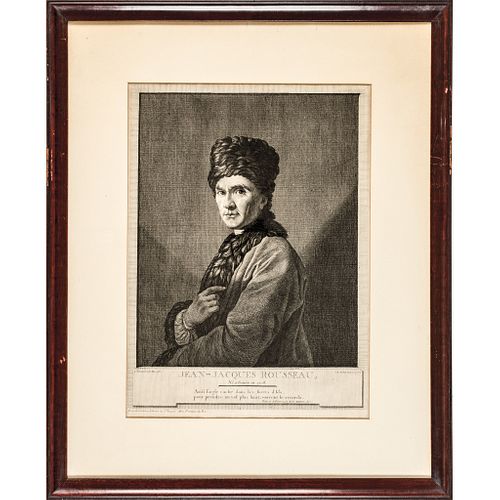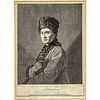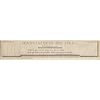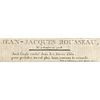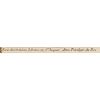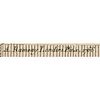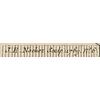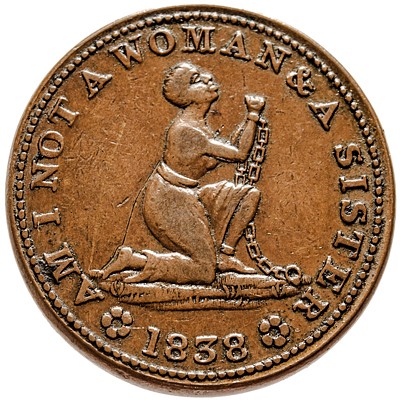1769 Rare Engraving of JEAN-JACQUES ROUSSEAU, Ne a Geneve en 1708 by J.E. Nocher
Lot 260
Categories
Estimate:
$2,200 - $2,800
Absentee vs Live bid
Two ways to bid:
- Leave a max absentee bid and the platform will bid on your behalf up to your maximum bid during the live auction.
- Bid live during the auction and your bids will be submitted real-time to the auctioneer.
Bid Increments
| Price | Bid Increment |
|---|---|
| $0 | $10 |
| $200 | $20 |
| $300 | $25 |
| $500 | $50 |
| $1,000 | $100 |
| $2,000 | $200 |
| $3,000 | $250 |
| $5,000 | $500 |
| $10,000 | $1,000 |
| $20,000 | $2,000 |
| $30,000 | $2,500 |
| $50,000 | $5,000 |
| $100,000 | $10,000 |
| $200,000 | $20,000 |
| $300,000 | $25,000 |
| $500,000 | $50,000 |
About Auction
By Early American History Auctions
Feb 27, 2021
Set Reminder
2021-02-27 12:00:00
2021-02-27 12:00:00
America/New_York
Bidsquare
Bidsquare : Black History & Slavery, Historic Autographs, Colonial America & Weapons
https://www.bidsquare.com/auctions/early-american-history-auctions/black-history-slavery-historic-autographs-colonial-america-weapons-6434
318 Lots of Rare, Historic Autographs, Americana, Civil War Era, George Washington, Abraham Lincoln, Slavery & Black History, Revolutionary War Era, Colonial America, Federal Period, War of 1812, Colonial Currency, Historic Early American Guns & more... Early American History Auctions auctions@earlyamerican.com
318 Lots of Rare, Historic Autographs, Americana, Civil War Era, George Washington, Abraham Lincoln, Slavery & Black History, Revolutionary War Era, Colonial America, Federal Period, War of 1812, Colonial Currency, Historic Early American Guns & more... Early American History Auctions auctions@earlyamerican.com
- Lot Description
Colonial America
Engraved Portrait of Jean-Jacques Rousseau, After Allan Ramsay's Painting, Engraved by J. E. Nocher 1769
1769-Dated, Engraved Portrait of Philosopher Jean-Jacques Rousseau (1712-1778), Engraved by J.E. Nocher, Paris, France, Framed, Choice Extremely Fine.
Original Engraved Portrait of Jean-Jacques Rousseau, measuring 11.75" x 16" (by sight), matted and framed to 19.75" x 24", not examined out of its frame. This historic half-length Portrait of Rousseau shows him facing left and looking forwards, captioned: "JEAN-JACQUES ROUSSEAU, / Ne a Geneve en 1708." above poem in French. Engraving is After the original historic painting by "A. Ramsay, Londini Pina, 1766" (Rousseau wearing an Armenian costume) and is engraved here by "J.E. Nocher, Sculp. 1769, No.6", and under image reads: "Paris chez Delalain, Libraire, rue St. Jacques, Avec Privilege du Roi." This Engraved Portrait is regarded as the single finest and most important work by J.E. Nocher, who flourished at Paris about 1760. He studied under Stephen Fressard, and engraved several book ornaments and portraits, among which is this important example of Jean-Jacques Rousseau. A rare print, framed and ready for display.
Jean-Jacques Rousseau, French: (June 28, 1712 - July 2nd, 1778) was a Philosopher, Writer, and Composer of the 18th century. His political philosophy influenced the Enlightenment in France and across Europe, as well as aspects of the French Revolution, and the overall development of modern political and educational thought.
Rousseau's novel "Emile," or On Education is a treatise on the education of the whole person for citizenship. His sentimental novel "Julie," or the New Heloise was of importance to the development of pre-romanticism and romanticism in fiction.
Rousseau's autobiographical writings-his Confessions, which initiated the modern autobiography, and his Reveries of a Solitary Walker-exemplified the late 18th-century movement known as the Age of Sensibility, and featured an increased focus on subjectivity and introspection that later characterized modern writing. His Discourse on Inequality and The Social Contract are cornerstones in modern political and social thought.
"The first man who, having fenced in a piece of land, said 'This is mine', and found people nave enough to believe him, that man was the true founder of civil society. From how many crimes, wars, and murders, from how many horrors and misfortunes might not any one have saved mankind, by pulling up the stakes, or filling up the ditch, and crying to his fellows: Beware of listening to this impostor; you are undone if you once forget that the fruits of the earth belong to us all, and the earth itself to nobody." - Rousseau 1754
In common with other philosophers of the day, Rousseau looked to a hypothetical State of Nature as a normative guide.
During the period of the French Revolution, Rousseau was the most popular of the philosophes among members of the Jacobin Club. He was interred as a national hero in the Panthon in Paris, in 1794, 16 years after his death.
Our Auction Contents:
Black History & Slavery: (Lots 1 - 63)
Abraham Lincoln Related: (Lots 64 - 74)
Historic Autographs: (Lots 75 - 235)
Colonial America: (Lots 236 - 261)
Revolutionary War: (Lots 262 - 304)
George Washington Related: (Lots 305 - 306)
Early American Guns & Weapons: (Lots 307 - 318) - Shipping Info
-
Early American provides in-house worldwide shipping. Please contact us directly if you have questions about your specific shipping requirements.
-
- Buyer's Premium



 EUR
EUR CAD
CAD AUD
AUD GBP
GBP MXN
MXN HKD
HKD CNY
CNY MYR
MYR SEK
SEK SGD
SGD CHF
CHF THB
THB